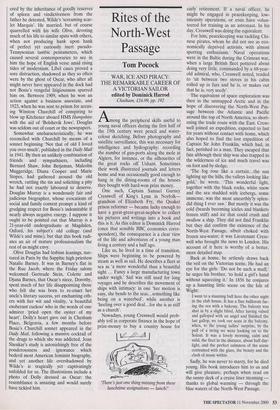Rites of the North-West Passage
Tom Pocock
WAR, ICE AND PIRACY: THE REMARKABLE CAREER OF A VICTORIAN SAILOR edited by Dominick Harrod Chatham, £16.99, pp. 192 Among the peripheral skills useful to young naval officers during the first half of the 19th century were pencil and water- colour sketching. Before photography and satellite surveillance, this was necessary for intelligence and hydrography: recording the number of gun-ports along the mole at Algiers, for instance, or the silhouettes of the great rocks off Ushant. Sometimes their work illustrated journals and letters home and was occasionally good enough to hang in the dining-rooms of the houses they bought with hard-won prize money.
One such, Captain Samuel Gurney Cresswell of King's Lynn in Norfolk— grandson of Elizabeth Fry, the Quaker prison reformer — became lucky enough to have a great-great-great-nephew to collect his pictures and writings into a book and this is it. As this editor is Dominick Harrod (once that sensible BBC economics corre- spondent), the consequence is a clear view of the life and adventures of a young man living a century and a half ago.
Like us, he lived in a time of transition. Ships were beginning to be powered by steam as well as sail. He describes a fleet at sea as 'a more wonderful than a beautiful sight ... Fancy a large manufacturing town under weigh.' Sail was still used for long voyages and he describes the movement of ships with intimacy: in one 'her motion is easy, she bends to the seas...something like being on a waterbed', while another is `heeling over a good deal...for she is as stiff as a church'.
Nowadays, young Cresswell would prob- ably toil in corporate finance in the hope of prize-money to buy a country house for `There's just one thing missing from these lunchtime assignations — lunch!' early retirement. If a naval officer, he might be engaged in peacekeeping, low- intensity operations, or even have volun- teered for training as an astronaut. In his day, Cresswell was doing the equivalent.
For him, peacekeeping was tackling Chi- nese pirates, whom he did not see as eco- nomically deprived activists, with almost sporting enthusiasm. Naval operations were in the Baltic during the Crimean war, when a large British fleet pottered about doing very little, commanded by a 68-year- old admiral, who, Cresswell noted, tended to 'sit between two stoves in his cabin rolled up in furs and he is, or makes out that he is, very seedy'.
The equivalent of space exploration was then in the unmapped Arctic and in the hope of discovering the North-West Pas- sage between the Atlantic and Pacific around the top of North America, so short- ening the trade route with the East. Cress- well joined an expedition, expected to last for years without contact with home, which also hoped to find the lost expedition of Captain Sir John Franklin, which had, in fact, perished to a man. They escaped that fate although their ship was also trapped in the wilderness of ice and much travel was on foot and by sledge.
`The fog rose like a curtain...the sun lighting up the hills, the valleys looking like gold,' he wrote. 'This wonderful light, together with the black rocks, white snow and the sea studded with icebergs, some immense, was the most unearthly'ly splen- did thing I ever saw.' But mostly it was the cold (beards becoming icicles and blankets frozen stiff) and ice that could crush and swallow a ship. They did not find Franklin but they did confirm the existence of the North-West Passage, albeit choked with frozen sea-water; it was Lieutenant Cress- well who brought the news to London. His account of it here is worthy of a better, more detailed map.
Back at home, he artlessly draws back the veil on the Victorian scene. He had an eye for the girls: 'Do not be such a muff,' he urges his brother, 'to hold a girl's hand without squeezing it.' In 1856 he conjures up a haunting little scene on the Isle of Wight:
I went to a stunning ball here the other night in the club house. It has a fine ballroom fac- ing the sea with a balcony. The balcony was shut in by a slight blind. After having valsed and galloped with an angel and finished the last gallop, we took our seats in the balcony, when, to the young ladies' surprise, by the pull of a string we were looking on to the Solent. It was a lovely morning, calm and mild, the fleet in the distance, about half day- light, and the perfect calmness of the scene contrasted with the glare, the beauty and the clash of music within.
Sadly, he was never to marry, for he died young. His book introduces him to us and will give pleasure, perhaps when read on the sunny deck of a cruise liner steaming thanks to global warming — through the blue waters of the North-West Passage.


























































































 Previous page
Previous page